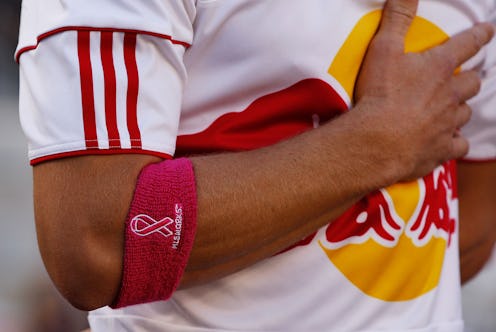News
Let's Talk About Male Breast Cancer
For more than 20 years, the symbol of breast cancer has been the pink ribbon. That image, created by the Susan G. Komen Foundation, triggered a nationwide movement, bringing greater attention to the disease and the hundreds of thousands of women it affects each year. But according to the Food and Drug Administration, it's high time that drug companies focus on male breast cancer, especially when it comes to clinical trials.
"Men have historically been excluded from breast cancer trials," Dr. Tatiana Prowell, a breast cancer scientific lead at the FDA’s Office of Hematology & Oncology Products, said in a statement. "We are actively encouraging drug companies to include men in all breast cancer trials unless there is a valid scientific reason not to."
Powell recently told the Daily Beast that by including male breast cancer patients in clinical trials, medical researchers will be able to see whether or not men respond differently to new treatments. Currently, male and female breast cancer patients receive the same treatment, but there's a possibility treatment success could vary between the sexes. “Our data on treatments for men are largely based from trials that were conducted in women," Powell added in an FDA statement.
It's also worth noting that many new breast cancer drugs are only available through clinical trials — which means male patients are consistently being left out of new and improved treatments.
Why have men been left out of breast cancer clinical trials as well as the overall discussion of breast cancer? A big part of that has to do with the numbers: According to the Centers for Disease Control and Prevention, less than one percent of breast cancer cases in the United States occur in male patients. About 2,000 men are diagnosed with breast cancer each year, resulting in roughly 500 deaths.
In comparison, the American Cancer Society estimates that there'll be 232,570 breast cancer cases in women in 2014, and 40,000 deaths. Currently, breast cancer is the leading cancer among American women. Because of this reality, breast cancer has become a point of solidarity for women, but a stigma among men.
The FDA is trying to change that. While breast cancer won't be a commonality that unites men like it does women, including male patients in clinical trials will at least help bring men into the conversation. If breast cancer is destigmatized among men, it may help them catch the disease in an earlier stage — and save lives. Currently, men are more likely to be diagnosed with breast cancer in a later stage than women.
"You'd think that because men have smaller breasts they would notice a lump instantly," Powell said. "But men don't expect a breast lump to be cancer, whereas most women who feel a breast lump immediately assume the worst."
The FDA hopes that if more male patients join clinical trials, then it will let them see the bigger picture when it comes to breast cancer. Without "large randomized trials," then FDA researchers won't know for certain how breast cancer affects men, how medical professionals can treat it, or how many more lives they can save.
